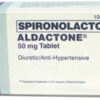Medication Overview Aldactone
Aldactone, a brand name for the drug spironolactone, is a potassium-sparing diuretic. It works by preventing the body’s absorption of salt while keeping potassium levels from falling too low. It is available in tablet form and is primarily used as an antihypertensive and for conditions associated with fluid retention.
Common Uses Aldactone
Aldactone is commonly prescribed for the treatment of heart failure, hypertension, and edema associated with congestive heart failure, cirrhosis of the liver, and nephrotic syndrome. Additionally, it is utilized for treating primary hyperaldosteronism. Its effect as an antiandrogen makes Aldactone useful for managing features of androgen excess, such as in polycystic ovary syndrome (PCOS) and acne.
Dosage Guidelines Aldactone
The dosing of Aldactone varies based on the condition being treated. For hypertension, the typical starting dose is 50 to 100 mg per day, either as a single dose or divided doses. For heart failure, the usual maintenance dose ranges from 25 to 50 mg per day. Adjustment of doses should be considered based on renal function and electrolyte levels. It remains important to adhere to the prescribed dosage and consult healthcare professionals before making any changes.
Administration Instructions Aldactone
Aldactone should be taken orally, with or without food, preferably at the same time each day. Consistency helps maintain stable drug levels in the body. It is important to swallow the tablet whole, without crushing, chewing, or breaking it, to ensure proper release and absorption. Always follow the instructions provided by your healthcare provider and read the medication guide carefully.
Possible Drug Interactions
Aldactone can interact with other medications, which might affect how it works or increase the risk of serious side effects. Concomitant use with other potassium-sparing diuretics, ACE inhibitors, or potassium supplements may lead to hyperkalemia. Additionally, Aldactone may interact with digoxin, lithium, and NSAIDs, which can influence both safety and efficacy. Always inform your healthcare provider about all medications and supplements you are taking.
Managing Side Effects Aldactone
While taking Aldactone, some common side effects may include dizziness, headache, and gastrointestinal discomfort. More serious side effects can be hormonal disturbances such as gynecomastia, menstrual irregularities in females, and deepening of the voice. Frequent monitoring of electrolytes and renal function is advisable to prevent adverse effects associated with hyperkalemia and renal impairment. Contact a healthcare professional if any severe or unexpected reactions occur.
Storage Requirements Aldactone
Store Aldactone tablets in a cool, dry place away from direct sunlight and moisture. The optimal storage temperature is between 20°C to 25°C (68°F to 77°F). Keep the medication in its original container, tightly closed, and out of reach of children and pets. Do not store Aldactone in the bathroom to avoid exposure to humidity.
Specific Patient Considerations
Special consideration should be given when prescribing Aldactone to patients with renal impairment, due to the increased risk of hyperkalemia and worsening of kidney function. Patients with liver disease may also require dosage adjustments owing to altered metabolism. It may not be suitable for use during pregnancy or breastfeeding without careful risk assessment. Tailor treatment to individual patient needs and circumstances.
Monitoring Parameters Aldactone
Close monitoring of potassium levels, renal function, and blood pressure is essential while on Aldactone therapy. Regular blood tests are recommended to check electrolytes and kidney function, enabling timely adjustments in dosing and management. Health professionals should reassess the therapy’s efficacy and safety periodically to ensure optimal outcomes for patients.
Mechanism of Action Aldactone
Aldactone acts primarily as an antagonist of the mineralocorticoid receptor in the renal distal convoluted tubule and collecting duct. It inhibits the effects of aldosterone, a hormone that promotes sodium retention and potassium excretion. By blocking aldosterone, Aldactone helps in removing excess sodium and water from the body, leading to its diuretic and antihypertensive effects while conserving potassium.
Pharmacokinetics Aldactone
After oral administration, spironolactone is rapidly absorbed and undergoes extensive hepatic metabolism. Its principal metabolite, canrenone, contributes significantly to its pharmacological effects. The half-life of spironolactone is approximately 1.4 hours, whereas canrenone exhibits a longer half-life of about 13.8 to 16.5 hours, enabling once-daily dosing. Spironolactone and its metabolites are mainly excreted via the urine.
Cost and Availability Aldactone
Aldactone is available via prescription and its cost can vary depending on the manufacturer and insurance coverage. Generic versions are often available at a lower cost. Pharmacies may provide options for both brand-name and generic, allowing patients flexibility based on financial considerations. Patients are encouraged to contact their insurance providers for detailed information on cost coverage.





Reviews
There are no reviews yet.